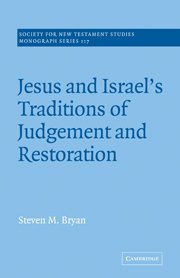Book contents
- Frontmatter
- Contents
- Acknowledgements
- Abbreviations and citation conventions
- Note on texts used
- 1 Introduction
- 2 Jesus and signs of national restoration
- 3 Jesus and the Scriptures of Israel
- 4 Jesus and the restoration traditions of Israel
- 5 Jesus and the purity of Israel
- 6 Jesus and the eschatological Temple
- 7 Conclusion
- Bibliography
- Index of passages
- Index of subjects
4 - Jesus and the restoration traditions of Israel
Published online by Cambridge University Press: 22 September 2009
- Frontmatter
- Contents
- Acknowledgements
- Abbreviations and citation conventions
- Note on texts used
- 1 Introduction
- 2 Jesus and signs of national restoration
- 3 Jesus and the Scriptures of Israel
- 4 Jesus and the restoration traditions of Israel
- 5 Jesus and the purity of Israel
- 6 Jesus and the eschatological Temple
- 7 Conclusion
- Bibliography
- Index of passages
- Index of subjects
Summary
I have thus far concluded that the scriptural traditions used by Jesus in his assessment of the nation's salvation-historical location were not those which projected the imminent return of Israel to national dominion but those which anticipated a coming national judgement and serviced a reconception of Israel's election. This, however, is not to say that Jesus held no positive expectation of Israel's restoration. In what follows I take up some of the key ways in which Jesus made positive use of restoration traditions and propose a model for understanding Jesus' conception of the eschatological people of God as restored Israel. My aim is to show that contrary to the common belief that Israel's restoration would entail its reconstitution as a tribal league, Jesus believed the eschatological shape of Israel had already been determined through the ministry of John the Baptist. Such a belief implies a conviction that God had so restored Israel that even certain constitutional features of the eschaton had taken form.
Elijah's restoration
A passage which has received insufficient attention in the now commonplace description of Jesus as a prophet of Jewish national restoration is ironically the only text in the synoptic traditions in which Jesus explicitly employs restoration language. The text is Mark 9.11–13 (par. Matt. 17.10–13):
As they were coming down the mountain, he ordered them to tell no one about what they had seen, until after the Son of Man had risen from the dead. So they kept the matter to themselves, questioning what this rising from the dead could mean. Then they asked him, ‘Why do the scribes say that Elijah must come first?’ He said to them, ‘Elijah is indeed coming first to restore all things. How then is it written about the Son of Man, that he is to go through many sufferings and be treated with contempt? But I tell you that Elijah has come, and they did to him whatever they pleased, as it is written about him.’
- Type
- Chapter
- Information
- Jesus and Israel's Traditions of Judgement and Restoration , pp. 88 - 129Publisher: Cambridge University PressPrint publication year: 2002



